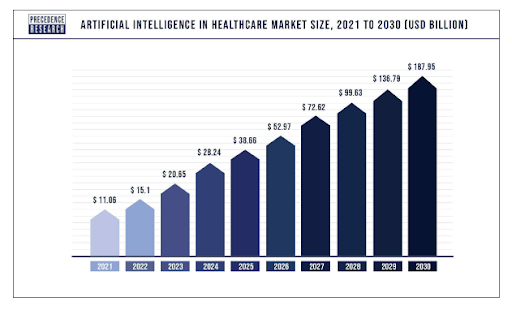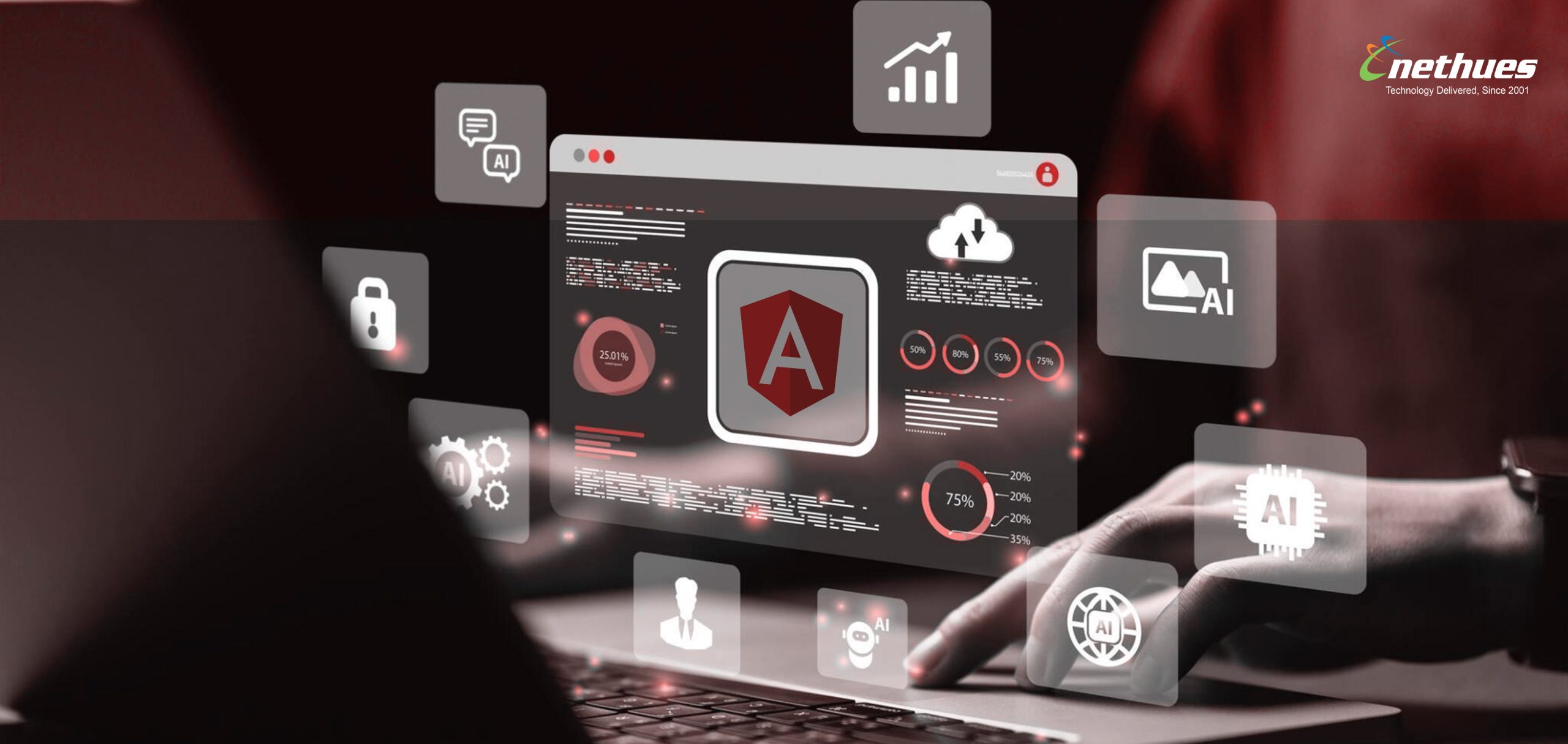Artificial intelligence is pivotal in the healthcare industry and has given birth to diverse use cases. The AI disruptive technology is proving effective in several healthcare applications like diagnosis, monitoring patients, planning for handling pandemic-like situations, enhancing health outcomes, and more.
AI-based healthcare app development solutions have overtaken the wellness market with various innovations and possibilities. Moreover, AI in the healthcare market was worth around 11.06 billion USD in 2021 and is expected to increase more than double-fold to $28.24 Billion in 2024.

Undoubtedly, AI is leading the healthcare industry and bridging the gap between the real & digital worlds.
Here are the Top Benefits of AI in Healthcare
Analyze Data and Enhance Diagnosis
AI technology is most famous for leveraging medical records and other healthcare data for quicker disease diagnosis of patients. Often, these diagnoses are accurate and help to save doctors and patients time in deciding the right course of treatment.
Healthcare mobile app development with AI integration holds significant potential in improving the medical diagnosis of chronic and non-chronic diseases. AI technologies can easily boost healthcare delivery for medical organizations.
Improved Patient Care
With the proper implementation of AI in healthcare, medical Institutions can enhance patient care significantly. For example, AI can help to cut down on research time, improve the optimum use of resources, and eliminate manual errors.
Patients can use AI-powered EHRs to store healthcare data on a single platform, eliminating the need to carry heavy files from one place to another. All the patient data over a single portal also improves the accuracy rate in diagnosis.
Cost-Effective Healthcare
AI and healthcare can help people with various cost-effective wellness programs. The technology has proven effective in reducing the time and cost of healthcare services in multiple ways. For example, AI can automate the burden of various time-consuming administrative tasks in healthcare organizations.
Reduces Staff Stress
As per various proven statistics, healthcare jobs are one of the most stressful fields of work and service. AI in health care can help significantly reduce stress issues by automating repetitive tasks and offering valuable insights into workplace dynamics. Moreover, healthcare providers need to address the mental health issues of staff for improved productivity & work-life balance.
Healthcare Digital Consultations
Integrating AI into wearable technology can empower healthcare digital consultants with more accurate diagnoses. Patients can easily monitor their health data and also gain insights into their health in real-time. It also becomes easier for medical providers to understand the patient’s health history using such technologies.
Understanding the Major Use-Cases of AI In Health Care
Real-world examples of artificial intelligence in healthcare vary from accurate diagnosis to streamlining various hospital management activities. The infographic below offers insights into some of the major applications of AI technology in the wellness industry.

Robot-Assisted Surgery
With computer technologies working in conjunction with robot systems, medical professionals are nowadays performing various simple and complex surgeries. The application of AI in computer-aided surgeries is visible in multiple forms.
Manufacturing companies can use deep learning data with the help of AI to enhance surgical robots’ control accuracy as well as submillimeter precision. The availability of deep machine learning data in the form of recorded videos further speeds up the processing of these complex mechanisms.
Use Case: The company Immersive Touch can create AI-based solutions for surgical planning and training with the advanced Immersive View Surgical Plan platform (an AI-based solution). This platform can convert 2D medical images into 3D special models.
Healthcare Management Systems or EHRs
Various world-class healthcare management systems can maintain patients’ records systematically. You can also customize one with the help of a Healthcare app development company. HMSs are also called EHRs (electronic health records) and can typically store the following data about the patient:
- Name, age, gender, and ethnicity
- Health history & medicines for ongoing illnesses
- Various allergies, the status of immunization of multiple vaccines
- Lab test results
- Hospital discharge instructions and data & billing information
Use Case: Hospitals mostly use Epic for EHR implementations as it provides high usability and various departmental functionalities. Over several years, Epic has become one of the biggest movers of EHR market share.
Supporting Clinical Decisions
Artificial intelligence, along with machine learning, is Significantly impacting the decision-making process for clinical providers. Technological data processing Healthcare professionals in diagnosing and planning the course of treatment for the patients.
Data-intensive specialties like radiology, pathology, etc., can benefit from artificial intelligence integration. Along with the integration of natural language processing, AI can also help with the translation of clinical notes in EHRs.
Use Case: An advanced team of researchers at CCDS has created a machine-learning algorithm for detecting motion when the patient is under an MRI scan.
Fraud Detection in Healthcare Claims
According to the US Justice Department, broad claims cost significantly in the healthcare sector. Roughly 3% of Healthcare based claims in the United States are false, which leads to a 100 billion annual loss. The integration of AI in healthcare claims can quickly detect invalid claims, further speeding up the entire process of validation and payment.
Use Case: To combat healthcare fraud effectively, Harvard Pilgrim Health is embracing artificial intelligence in its processes. The service provider leverages an AI-based fraud detection system to identify suspicious behavior and false claims.
Wrapping Up
That was all about the benefits of AI in healthcare and proven use cases. At Nethues, we have hands-on experience in healthcare app development services. Whether you want to integrate an EHR or build a custom hospital management solution, we can provide end-to-end services.






